Biden Speaks On Americans Held Hostage, Without Mentioning Iran
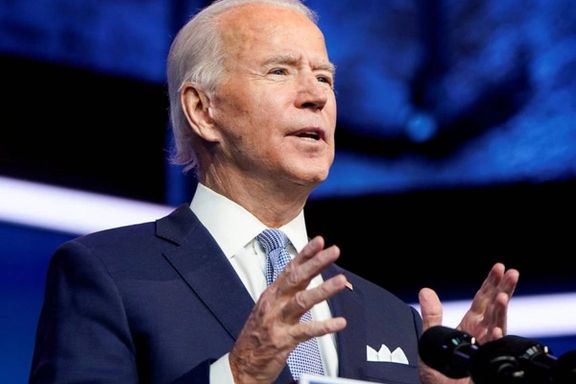
US President Joe Biden says Washington won't consider Taliban's legitimacy until Navy veteran Mark Frerichs is released by the group.

US President Joe Biden says Washington won't consider Taliban's legitimacy until Navy veteran Mark Frerichs is released by the group.
Biden said in a statement on Sunday that “The Taliban must immediately release Mark before it can expect any consideration of its aspirations for legitimacy”.
He said, “Threatening the safety of Americans or any innocent civilians is always unacceptable, and hostage-taking is an act of particular cruelty and cowardice”.
He addressed all the Americans being held hostage and wrongfully detained overseas, and their families and friends, saying, “Know that my administration will continue to work steadfastly until every American being unjustly held against their will comes home”.
However, Biden did not mention several hostages who are being held by the Islamic Republic of Iran despite calls by human rights organizations on the Biden Administration to press Tehran for their release during the Vienna nuclear negotiations.
Earlier in January, two former Iran hostages staged a hunger strike at the venue of the talks to revive the 2015 nuclear deal, hoping that their campaign can stop the United States from concluding a deal with Iran until the hostages are freed.
The US Special Envoy for Iran Robert Malley met with Barry Rosen, a US diplomat who was held hostage in the US embassy takeover in the early 1980s and stressed the importance of the release of four American-Iranians held in Iran but stopped short of saying their freedom was a precondition for Washington for reaching a nuclear deal with Iran.

Iran-backed Houthis fired a missile at the United Arab Emirates in the third such attack in January, while Israeli President Isaac Herzog was visiting the country.
UAE defense ministry said on Monday that the attack, 20 minutes past midnight was intercepted. There was no news of any missile hitting a target, but debris fell on an uninhabited area.
Yemen's Houthi group said on Monday it had fired a number of ballistic missiles at Abu Dhabi, capital of the United Arab Emirates, and had also fired several drones at Dubai, the regional business hub.
A senior official described the attacks as "useless" provocations that would be dealt with to safeguard national security and sovereignty. "Those who test the UAE are mistaken," the official, Anwar Gargash, said in a Twitter post.
The attack followed reports in Iranian media affiliated with the Revolutionary Guards (IRGC) on Sunday. Tasnim and Fars news agencies reported quoting Houthi officials that the Yemeni rebels were planning large attacks against the UAE and Saudi Arabia.
"Future strikes on the UAE will be more effective and more powerful than before and the UAE may lose its capability to run the country," Lieutenant-General Abed Al-Thour the Deputy Chief of the Ideological Department of the Houthi armed forces told Tasnim in an exclusive interview. He added that the Houthi military is determined to "go deep inside the UAE to achieve its military goals".
The spokesman of the State Department reacted to the attack in a tweet, saying, “We condemn the latest Houthi missile attack on Abu Dhabi. While Israel’s president is visiting the UAE to build bridges and promote stability across the region, the Houthis continue to launch attacks that threaten civilians.”
The Biden Administration lifted the terrorist designation for Houthis as soon as it assumed office last year, a move questioned by critics as an attempt to encourage the group to accept peace proposals. Houthis have refused to take any conciliatory step, such as agreeing to ceasefire.
Herzog, who was on a historic trip to UAE less than two years after establishing full relations, spent the night in Abu Dhabi. He discussed security and bilateral relations with the UAE’s de facto ruler Abu Dhabi Crown Prince Sheikh Mohammed bin Zayed Al Nahyan.
The spokesman of Iran’s foreign ministry, Saeed Khatibzadeh, commenting on Herzog’s visit to the UAE said, “Those who normalize relations [with Israel] should know…that the first victims would be” themselves.
"We are determined in our strategic vision and goals to help build a stable and prosperous region for all and provoking us is useless," said Gargash, diplomatic adviser to the UAE president.
The UAE's defense ministry said coalition warplanes had destroyed missile launchers that were located in Yemen.
The UAE is part of the Saudi-led coalition that has been battling the Houthis for nearly seven years in a conflict largely seen as a proxy war between Saudi Arabia and Iran.
The Houthis, who have repeatedly launched missile and drone attacks on Saudi Arabia, have warned they would continue targeting the UAE unless it stopped "interfering" in Yemen.
The UAE largely ended its military presence on the ground in 2019 but holds sway through Yemeni forces it arms and trains and which recently joined battles against the Houthis in key energy-producing regions.
With reporting by Reuters
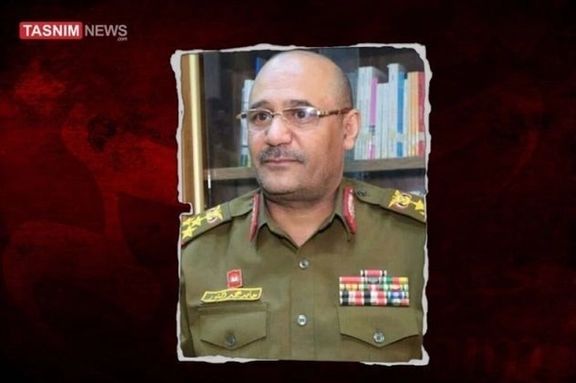
A Houthi in an interview with the IRGC-linked Tasnim Sunday has threatened the United Arab Emirates with "more effective and powerful strikes" in the future.
"Future strikes on the UAE will be more effective and more powerful than before and the UAE may lose its capability to run the country," Lieutenant-General Abed Al-Thour the Deputy Chief of the Ideological Department of the Houthi armed forces told Tasnim in an exclusive interview published Sunday. He added that the Houthi military is determined to "go deep inside the UAE to achieve its military goals".
Al-Thour said the Houthis' recent attacks on Abu Dhabi, dubbed Yemeni Storm 2, was a message to Mohamed bin Zayed, the Crown Prince of the Emirate of Abu Dhabi, that his country will pay a high price for his "efforts to appease Israel".
The Iran-backed Houthi military official said the Houthi army has reached "the military expansion and industrialization stage" and "self-sufficiency in military industries".
Al-Thour also threatened Saudi Arabia and said the Houthis are prepared for bigger operations "deep inside Saudi Arabia".
Iran has been arming and training the Houthi rebels for years, with United Nations experts verifying that drones and missiles used against Saudi Arabia having Iranian origin.
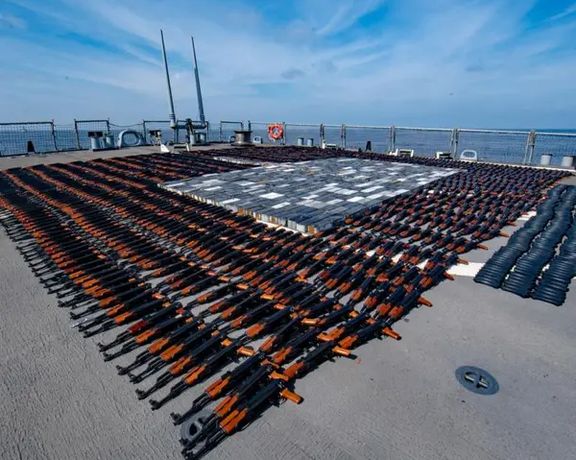
In 2019 Al-Thour made similar threats against the UAE. "I am telling you that the UAE – Abu Dhabi, Dubai, Al-Ain, Fujairah, and all those emirates – will lose everything they have," he said, adding that with its aerial strikes and missile force, Yemen will "send the UAE back to a time before its foundation" and that despite not having a border with the UAE, their air force and missile force could reach the country to strike its trade and economic capabilities.
On Sunday Fars, another IRGC-linked news agency in a report quoted the Houthi Al-Khabar Al-Yemeni news website as saying Houthis are planning to implement widespread operations against 50 economic and military targets across the Emirates.
Al-Khabar said on Sunday that sources in the Houthi military intelligence have said that “approximately 300 drones, 50 ballistic missiles and 46 cruise missiles" will be used in the operation dubbed "Al-Aram Flood" to “paralyze the UAE economy".
The Yemeni website quoted the Houthi Minister of Defense Mohamed al-Atifi as saying a few days after the attack on Abu Dhabi that "painful and terrifying strikes" were to be expected in the "strategic, military and economic depth of the coalition countries.”
The Saudi-led Coalition that backs Yemen's internationally recognized government said January 13 that the Iran-backed Houthi rebels had targeted a key oil facility in Abu Dhabi and the UAE capital's international airport with explosive-laden drones launched from Sana'a airport.
In 2019 the UAE, a member of the Saudi-led coalition that has been fighting Iran-backed Houthi forces for over seven years, scaled down its military presence in Yemen amid heightened regional tensions with Iran but the Houthis.
A few days after the attack on Abu Dhabi, the Houthi information minister Zeifollah al-Shami was interviewed by Tasnim news agency who said the attack was meant to tell the UAE that there would be retaliation if they continued to attack Houthi forces.
Fars said in a report entitled "The Reason for the Yemeni Attack on Abu Dhabi Today" called it the "biggest strike on the UAE in the country's 50-year history."
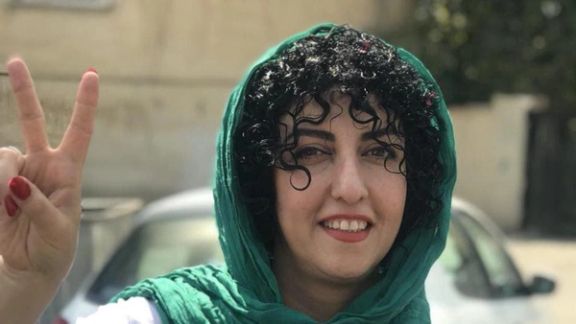
The European Union has decried a recent sentence for leading human rights campaigner Narges Mohammadi to eight years in prison and over 70 lashes.
In a statement on Sunday, the EU also expressed concern over her poor health, stressing that enforcing the sentence “is against the universal principles of human rights and the rule of law”.
“The EU calls on Iran to comply with its obligations under international law and urgently release Ms. Mohammadi, taking also into account her deteriorating health condition,” a spokesperson said.
On Friday, Human Rights Watch also slammedher arrest, saying that the Islamic Republic is committed to crush any grassroots effort to protect human rights and urged world powers to press Tehran to stop the crackdown.
The rights group said that the recent heavy sentence meted out against Mohammadi shows that Iran’s revolutionary courts are criminalizing human rights activism.
On January 15, Branch 26 of Tehran’s revolutionary court gave her the harsh sentence in a five-minute summary trial that was held behind closed doors while she was denied access to a lawyer.
In a letter from the notorious Gharchak (Qarchak) Prison, obtained by Iran International, Mohammadi said the court stated her nomination for the Nobel Peace Prize as evidence of her criminality.
Mohammadi was arrested in mid-November at the death anniversary of a citizen, Ebrahim Ketabdar, who was shot dead by security forces during the November 2019 protests.
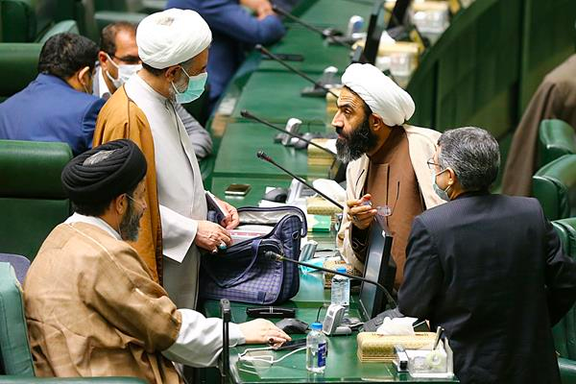
As another Covid-19 wave hit Iran in January, reports say that over 30 members of parliament have contracted the coronavirus and up to ten are hospitalized.
MP Abolfazl Aboutorabi said on Sunday that about 30 lawmakers have been diagnosed with Covid-19 in the past few days.
He said the parliament’s presidium has asked all the lawmakers to get tested for Covid-19 to help curb the spread of the virus.
Alireza Salimi, a member of the presidium, said 10 lawmakers have been hospitalized with complications, while another MP has said that paqrliament members attended the Saturday session although they were tested positive for the virus.
Iran's Health Minister Bahram Einollahi announced the start of the sixth wave of the coronavirus pandemic in the country on Thursday as hospitals report increasing number of referrals related to the highly infectious Omicron variant.
“Unfortunately, we should declare that we have practically stepped into the sixth wave with the rise in hospitalization and outpatient cases,” Einollahi said, urging people to get booster shots.
Epidemiologists say the number of patients will increase fivefold each week, with the number of daily fatalities also rising.
Alireza Zali, the head of Tehran's Covid-19 taskforce, has said the Omicron variant is 64 percent more contagious than the Delta mutation, noting that tests are often unable to detect Omicron because of its similarity to common cold.
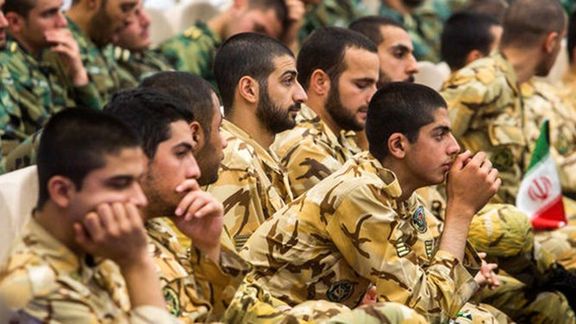
Iran has announced it will reinstitute a buy-out scheme for the country’s compulsory military service, but only affluent people can afford the fees mentioned.
According to parliament’s budget review committee spokesman on Saturday, the scheme has received preliminary approval and if it is adopted, Iranian men can buy out their military service as of the next Iranian year starting March 21.
The new plan only includes the absentees who are over 35 years old or at least eight years have passed from their conscription due date, the prices differing based on the levels of education, with those with higher education having to pay higher fees.
The new rates start at 2.5 billion rials (nearly $10,000 at today’s rates) and goes up to 6 billion rials, which are about 11 to 24 times more than the last time the government allowed such exemptions. Average salaries in Iran are about $200 a month.
The option to buy out of the draft was removed from regulations about three years ago because even then only wealthy families could afford it for their sons through paying absence fines.
According to Iran’s constitution, all men over 18 years old must serve in the military for about two years otherwise they cannot apply for a passport to leave the country.
Earlier in the month, a member of the budget committee said that all expats who haven’t served their compulsory conscription can pay €15,000 ($17,000) to buy their freedom.